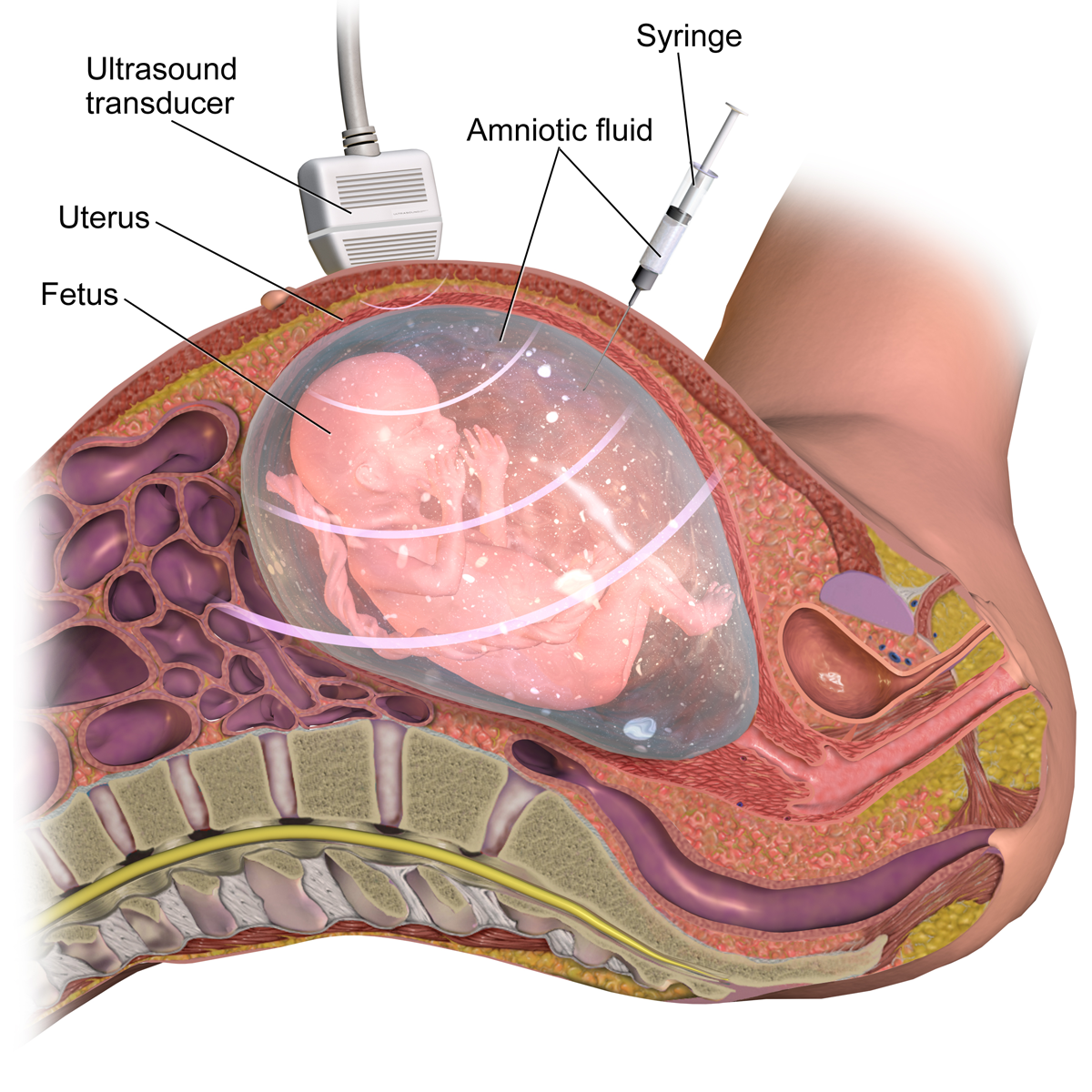Amniocentesis test

Amniocentesis is a procedure by which part of the amniotic fluid (the liquid contained within the amniotic sac) is removed for genetic testing during pregnancy. It is mainly used to detect anomalies in the baby's genes or chromosomes. Clinicians may recommend a pregnant woman to undergo this test for several reasons:
- Due to advanced age of the mother.
- The mother or her partner are carriers of a genetic disorder that can be passed down to the baby.
- There is a history of a genetic disorder in the family.
- The mother has previously had a child with a genetic disorder.
- Any of the tests performed during the pregnancy (ultrasound, nuchal translucency test, blood tests) suggest that the baby may be at risk of having a genetic disorder.
How is the procedure of amniocentesis performed?
First, clinicians do an ultrasound to confirm the position of the baby and the placenta. After cleansing the skin of the abdomen with an antiseptic solution, they insert a hypodermic syringe into the womb to withdraw a fluid sample (15 mL). This liquid contains cells from the baby's skin, which will be used in the laboratory for the analysis of the genes and the chromosomes. Although it is not frequent, sometimes the procedure fails to collect baby cells at the first attempt and the puncture has to be done twice.

When is amniocentesis performed?
The test is carried out after the 15th week of pregnancy.
Is amniocentesis painful?
Most women find the test uncomfortable, but not painful. The test takes only a few minutes. Some women may feel some tension and discomfort the next day, but this is normal.
What happens after amniocentesis?
The test is performed in a few minutes, but the woman should be accompanied by a person she trusts to support her during and after the test. It is convenient to take things easy for a couple of days, not to lift weight or do intense exercise after the procedure. If the woman experiences pain, fever, discharge or blood loss within 24 hours after the procedure, it is recommended to call the doctor.
What are the risks of amniocentesis?
Approximately 1 in 100 (1%) women experience a miscarriage after undergoing amniocentesis (statistics may vary slightly), with no known cause. However, 99% of pregnancies are completely normal after amniocentesis. There is no evidence that amniocentesis is dangerous for the baby.
Is amniocentesis reliable?
Reliability varies depending on what type of genetic or chromosomal disorder we are looking for. On some occasions (1%) during amniocentesis, we do not collect a sufficient number of cells and we cannot conduct a genetic analysis. In this case, clinicians may offer another test to the mother.
Can all genetic disorders be detected through amniocentesis?
Usually, the results of an amniocentesis refer to the genetic disorder that we are trying to find. Occasionally, they can reveal other alterations, but there is no global analysis for all known genetic disorders.
How long does it take to know the results?
It depends on the type of study. In some cases, it takes three days, but in other cases it may take 2-3 weeks. If clinicians take a little longer to communicate the results, it does not necessarily mean that there is something wrong with the test. Maybe the cell culture is growing more slowly than expected. It is important to ask the doctor when they will send the results and how they will be sent (in person or by mail).
What happens if the results reveal that the baby has a genetic disorder?
In this case, the doctor will explain the nature of the genetic disorder and how it could affect the baby. They will also explain if there is an available treatment and the different options that can be considered, including termination of pregnancy. The results may very rarely show a chromosomal rearrangement with unknown consequences.
If the mother is HIV positive, the baby can be infected during amniocentesis. Therefore, it is very important for the doctor to know this so that he/she can minimize the risk.
Should I undergo amniocentesis? Making up your mind
It can be difficult to decide whether to have an amniocentesis done or not. Remember that there is no obligation to do it if you do not want to. This possibility should be considered if it is necessary to know the information that will result from the analysis and if we know that the risks are small.
To make the right decision, it is essential to ask your doctor about the following issues:
- Information about the genetic study.
- The probability that the baby is a carrier of a genetic disorder.
- Information on the reliability of the results.
- The likelihood of inconclusive results involving repeat amniocentesis.
- Risk of spontaneous miscarriage.
- The time it will take to know the results.
- The options available if the baby has a genetic defect.
- How this experience can affect you emotionally.
